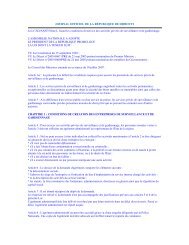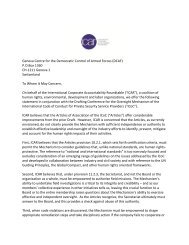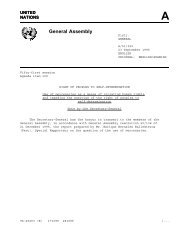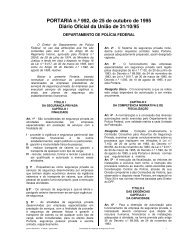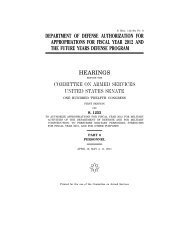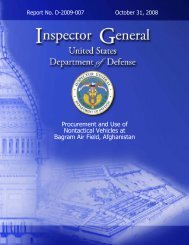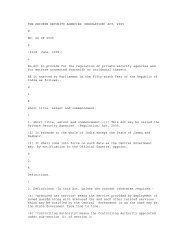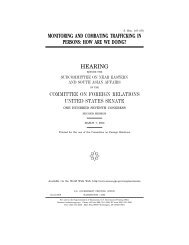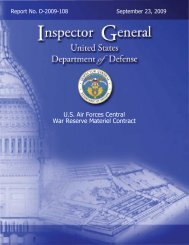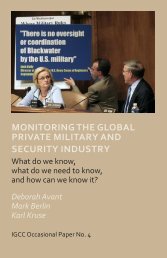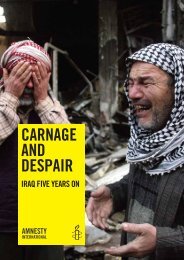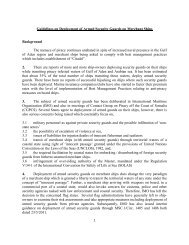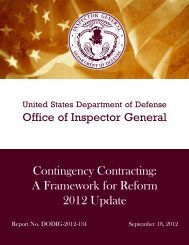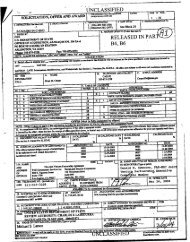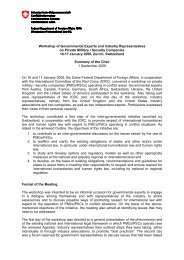Security Assistance; and Logistics - Federation of American Scientists
Security Assistance; and Logistics - Federation of American Scientists
Security Assistance; and Logistics - Federation of American Scientists
Create successful ePaper yourself
Turn your PDF publications into a flip-book with our unique Google optimized e-Paper software.
those deficiencies are many, but the root cause appears to be lack <strong>of</strong> unity <strong>of</strong> effort acrossDoD <strong>and</strong> U.S. Government agencies. Rather than postponing action until a moretraditional security cooperation relationship develops at an unknown date in the future,USCENTCOM should use all means available to achieve unity <strong>of</strong> effort now, with anemphasis on focused, comprehensive planning <strong>and</strong> interagency engagement. The Theater<strong>Security</strong> Cooperation plan is a valuable means to focus combatant comm<strong>and</strong> efforts, butit is not available to DoD elements in country. These issues are described in greaterdetail below, particularly at our response to Recommendation 20.c. on page 146.We request that USCENTCOM reconsider its position on the recommendation <strong>and</strong>provide comments on the final report.19.a.(2) We recommend that the Comm<strong>and</strong>er, U.S. Central Comm<strong>and</strong> coordinate regularin-country training for Iraq <strong>Security</strong> Forces personnel with DoD sources such as theDefense Medical Readiness Training Institute <strong>and</strong> the Uniformed Services University <strong>of</strong>the Health Sciences.Client CommentsComm<strong>and</strong>er, USCENTCOM partially concurred. USCENTCOM stated that theresponsibility for day-to-day engagement <strong>and</strong> training activities rested with forcescurrently located in Iraq (MNF-I <strong>and</strong> MNSTC-I), <strong>and</strong> that ongoing training <strong>and</strong> educationactivities were occurring. Furthermore, USCENTCOM stated that those trainingactivities were best developed by personnel in country who possessed an intimateknowledge <strong>of</strong> <strong>and</strong> relationship with components <strong>of</strong> the Iraqi health care system. TheComm<strong>and</strong>er reported that the role <strong>of</strong> the USCENTCOM SGO was to assist in identifying<strong>and</strong> facilitating relationships that supported the training <strong>and</strong> education mission <strong>of</strong> forcesassigned in Iraq <strong>and</strong> to maintain a strategic role in the training <strong>and</strong> education mission toensure a clear vision <strong>of</strong> health system development goals <strong>and</strong> continuity betweensuccessive assigned personnel.Our ResponseComm<strong>and</strong>er, USCENTCOM’s comments were not responsive to the intent <strong>of</strong> therecommendation. While we agree that training activities for the Iraq <strong>Security</strong> Forces aregreatly influenced by the personnel in country who are working with the Iraqi health caresystem on a daily basis, we believe that the Theater Comm<strong>and</strong>er is in a unique position toleverage strategic partnerships with greater facility than the comm<strong>and</strong>er in country. Seeour summary response at Recommendation 20.c. on page 146 for greater detail. Werequest that USCENTCOM reconsider its position on the recommendation <strong>and</strong> providecomments to the final report.19.b.(1) We recommend that the Comm<strong>and</strong>er, Multi-National Force-Iraq mentor IraqiArmy health care personnel at the Iraqi Ground Forces Comm<strong>and</strong>, division, brigade, <strong>and</strong>unit levels by Coalition partners (this is discussed in more detail in Observation 20).131



